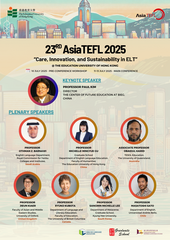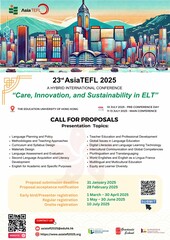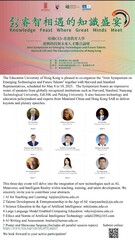Public Lecture Series 2024
- 02 Mar, 2024 - 23 Mar, 2024 | 9:30am-12:00nn
- Online (ZOOM)
- Seminar
- English
- Department of English Language Education
Public Lecture Series 2024
You may register for the whole series or a particular day that interests you.
E-certificates of attendance will be issued to participants.
Seminar 1: Adapting CLIL Principles to design tasks for the local language needs in the content classroom
Speaker: Dr. Curtis Green-Eneix, The Education University of Hong Kong
Teachers often encounter a pressing question as linguistically diverse students enter their content classroom: Where and how do I create opportunities to develop students' second language in my content classroom? As expectations increase to support students’ linguistic development in their content classroom, teachers are often left on their own to figure out how to balance teaching content- and language-oriented outcomes, often referred to as Content-Language Integrated Learning (CLIL). This results in either teaching only the target language or not at all. In this public lecture, the talk will review the methodology surrounding CLIL pedagogy and then provide teachers with a few examples of how teachers have adapted CLIL. Lastly, the talk will conclude by leaving teachers with activities to help them bridge the provided examples to their classroom to fit what they learned to their local needs in the classroom.
About the Speaker:
Dr. Curtis Green-Eneix is a Research Assistant Professor in the English Language Education Department at the Education University of Hong Kong. He received his Ph.D. in Second Language Studies from Michigan State University. Dr. Green-Eneix has published in TESOL Journal, English Today, and System, focusing on equitable language education, identity and language ideologies, and teacher development.
Seminar 2: Empowering Language Learners and Decolonizing English Classrooms: The Role of Mother Tongue and Local Culture
Speaker: Dr. Zhang Yue Ellen , The Education University of Hong Kong
The decolonial turn in language learning and teaching and applied linguistics has reinvigorated thinking about what it means to decolonize language and literacy education. English classroom activities are suggested to provide English learners with a sense of language ownership over meaning to empower them. It will enable them to actively and agentively engage with language and literacy practices that foreground their own culture, community, and language. In this talk, I will discuss how to shift the once-privileged role of English in EMI classrooms and empower Hong Kong English learners to construct and perform their identity as multilinguals who possess multiple literacies. I will share with you how his can be done in a task that enabled learners to be encouraged to invest in decolonizing practices and assert themselves as legitimate speakers with the right to speak English (Darvin & Zhang, 2023). Enrolled in a communications course, students were invited to create a YouTube video to elaborate on a Cantonese word that cannot be translated into English. By doing so, students used Cantonese, English, Putonghua, images, sounds, and multiple resources to 1) explain these translational gaps, 2) reflect on their languages and cultures, and 3) develop an awareness of the way language works.
About the Speaker:
Yue Zhang is an Assistant Professor in Department of English Language Education, The Education University of Hong Kong. She has earned her M.Phil. and Ph.D. in Applied English Linguistics in the Department of English, The Chinese University of Hong Kong. Her research areas include language identity and investment, L2 motivation, computer-assisted language learning, critical inquiry and pedagogy, and language teacher education. She has been teaching at the tertiary level in Mainland Chinese and Hong Kong contexts for nine years. Her publications have appeared in Computer Assisted Language Learning, TESOL Quarterly, Language Awareness, ReCALL, Journal of Multilingual and Multicultural Development, System, and Chinese Journal of ESP.
.png)
Registration link: https://eduhk.au1.qualtrics.com/jfe/form/SV_2hKAR0HMmIW6sPs
Seminar 3: Engage, Innovate, Inspire: Practical Tips and Tricks for Using AI in the Classroom.
Speaker: Lucas KOHNKE, The Education University of Hong Kong
In this interactive workshop, discover how to harness the power of AI tools, including ChatGPT, to enhance your teaching practice. You will gain hands-on experience and the essential skills to seamlessly blend various AI tools into your teaching repertoire effectively. What you will learn: developing instructional materials, designing interactive learning opportunities, crafting effective prompts and practical application exercises.
About the Speaker:
Dr Lucas Kohnke is a Senior Lecturer in the Department of English Language Education, The Education University of Hong Kong. Lucas specializes in integrating technology with English language learning and teaching. His research has been published in journals such as Journal of Education and Information Technologies, Educational Technology & Society, RELC Journal, as well as other leading journals.
Seminar 4: Critically Engaged Workshop as a Decolonial Research Method in Language and Literacy Education
Speaker: Dr. Pramond Sah, The Education University of Hong Kong
There is a growing awareness among scholars in applied linguistics that a collaborative and decolonial approach to research is necessary, which should have an activist agenda promoting not only advocacy for marginalized groups but also working with these groups to bring about meaningful changes. In this regard, what I call the “Critically Engaged Workshop” (CEW) can be a decolonial research method that fosters critical awareness and empowerment among marginalized populations through anti-racist engagement in meaningful research activities in addition to answering research questions. CEW as a research method conceptualizes decoloniality within a transformative paradigm that recognizes the significance of “praxis” in applied linguistic research, a potential transformation of the world through (a) reflection on positionality, privilege/marginalization, and power dynamics through anti-racist narratives and (b) collaborative and individual action for change through grassroots or community-based activities.
CEWs have a dual purpose of investing in given applied/sociolinguistic issues and situations through “generative design tools” and fostering anti-racist and anti-colonial thinking and actions through a participatory action approach. In other words, CEW is a different method that creates a collaborative space for interactions to navigate lived experiences and promote social action, leading to activism based on action learning. It affords critical awareness of language and its social relations through community and school interactions.
About the Speaker:
Dr. Pramod K. Sah is an Assistant Professor in the Department of English Language Education at The Education University of Hong Kong. He also holds an Honorary Norham Fellow position at the Department of Education, University of Oxford. Before joining EduHK, he worked as a Postdoctoral Associate at the University of Calgary’s Werklund School of Education. He serves as an Editor-in-Chief of the Journal of Education, Language, and Ideology. His primary scholarly focus is investigating how colonial and liberal ideologies in language policy and practices create educational, socioeconomic, and socioemotional disparities among diverse students. The central goal of his research is to conceptualize anti-oppressive and asset-based alternatives for pedagogies (e.g., linguistically and culturally sustaining pedagogies and critical translanguaging), research, and policies.
.png)
Registration link: https://eduhk.au1.qualtrics.com/jfe/form/SV_3ODGbh2gmzFoyN0
Seminar 5: Innovating with the Multimodalities-Entextualization Cycle (MEC) in Language Across the Curriculum (LAC) to improve ESL junior secondary students’ academic English literacy
Speaker: Dr. April Liu, The Education University of Hong Kong
Bilingual programmes in which a second language is used as the medium of instruction are gaining popularity in different parts of the world, and content and language integrated learning (CLIL), which is referred to as English medium instruction (EMI) in Hong Kong, is one type of such programmes. Recent research reports that many English as a second language (ESL) students cannot benefit from the exposure to the English language owning to limited English reading and writing proficiency. This seminar will report findings and share deliverables of an EdUHK project that aims to support ESL junior secondary students in EMI classrooms.
Informed by latest development in content and language integrated learning (e.g., Marsh, 2002; Lin, 2016) and translanguaging and trans-semiotizing which refers to the spontaneous multilingual, multisensory and multimodal meaning-making processes transcending named language boundaries (García and Li, 2014; Lin, 2019), the initiative supports junior ESL Secondary Students’ academic English Literacy with language across the curriculum (LAC) teaching resources designed using Lin (2015)’s Multimodalities-Entextualization Cycle (MEC), a curriculum design framework for incorporating translanguaging/trans-semiotizing pedagogy. Impact of the MEC framework on students’ content and language knowledge development will be discussed and teaching resources on LAC in different content subject areas will be shared.
About the Speaker:
Yiqi Liu (April) is an Assistant Professor in the Department of English Language Education at the Education University of Hong Kong. Her main teaching and research interests include discourse analysis, sociolinguistics, English language teaching and Language across the Curriculum (LAC)/Content and Language Integrated Learning (CLIL).
Seminar 6: Brainstorming the Future of English Teaching in Hong Kong: Is Technology a Friend or a Foe?
Speaker: Dr. Taylor Timothy William, The Education University of Hong Kong
The Hong Kong English Curriculum has undergone many changes in recent decades, and the transformation is still in progress. One unanswered question is: What is the role of technology – and what should it be? The experience of local teachers differs dramatically, with many considering technology as their best friend and ally in teaching; while others consider technology as a troublesome obstacle – even a foe of good English teaching. This talk will first examine the role of technology in the Hong Kong English classroom and its evolving place in recent years. Based on both historical patterns and contemporary trends, we will then brainstorm what the future role of technology in the English curriculum may look like. Finally, based on local and international best practices, the talk will offer practical recommendations for teachers and English curriculum leaders on how to make the best use of technology – and not let it get in the way of great teaching talent.
About the speaker:
Dr Tim Taylor is an experienced English teacher and teacher educator. He is currently the Associate Head of the Department of English Language Education and was formerly the Chair of the Hong Kong Curriculum Development Council Committee on English Language. He has worked extensively on curriculum projects with local schools, focused on the professional development of English teachers and the integration of technology into the school-based curriculum. Besides living and working in Hong Kong for more than 20 years, Dr Taylor has worked in English education at primary, secondary and university levels in many countries, including the United States, Papua New Guinea and Mainland China.
.png)
Registration link: https://eduhk.au1.qualtrics.com/jfe/form/SV_6xqFHBoihddMCMK
Seminar 7: This is not a dream: Motivating your students to learn English
Speaker: Dr. Ruth Wong, The Education University of Hong Kong
Motivation is the most important factor in learning English. This talk will focus on practical ideas on how teachers can play a role in motivating students to learn English. Motivating students to learn English is not a dream. By reflecting on teachers’ common classroom teaching strategies, considering the learning environment of the students, and setting appropriate learning tasks and materials for students are some of the key aspects for motivating students to learn English. With over 23 years of teaching experience, the speaker will share her ideas on keeping students motivated.
About the Speaker:
Dr. Ruth Wong is an assistant professor at Department of English Language Education, The Education University of Hong Kong. Her research areas include student learning motivation, teaching pedagogy and cultural issues related to education. She has published textbooks, professional articles and research papers in various international journals.
Seminar 8: Using the Multimodalities-Entextualization Cycle (MEC) in Self-Directed Learning of Academic Literacies
Speaker(s): Prof Angel M. Y. Lin, The Education University of Hong Kong
Qinghua Chen, The Education University of Hong Kong
Phoebe Siu, The Hong Kong Polytechnic University
The Multimodalities-Entextualization Cycle (MEC) was first introduced as a flexible curriculum planning tool to facilitate teachers and students at different institutional levels, ranging from primary, secondary to tertiary education, to co-create multimodal teaching and learning resources and experience through engaging in translingual, multimodal, and multisensory meaning making actions in different stages of a lesson or unit of work (Lin 2015a, 2016, 2019). In this public seminar, we will illustrate the use of the MEC as a tool to engage students in self-directed learning of academic English. Some useful digital apps will also be introduced to illustrate how the MEC can enhance students’ reading and note-taking experiences in their development of academic literacies in English.
About the Speaker(s):
Dr. Angel M. Y. Lin is Chair Professor of Language, Literacy and Social Semiotics in Education at the Education University of Hong Kong. Dr. Lin has been at the forefront of English language education and critical literacies since the late 1990s when she started working on classroom research projects in schools in Hong Kong. She has published widely on second language education, discourse analysis, translanguaging (TL), trans-semiotizing (TS), Content and Language Integrated Learning (CLIL), and critical media literacies.
Qinghua Chen is a postdoctoral fellow at the English Language Education Department of the Education University of Hong Kong. His current research interests include subjectivity, emotions, and identity of pre-service teachers and English language learners. He is particularly interested in exploring how these factors shape teaching and learning experiences in multicultural and multilingual contexts.
Phoebe Siu is a content specialist and lecturer specialising in Corporate Communication, Public Relations, Languages and Communication. She has been providing EAP, ESP and CLIL training to tertiary students in Hong Kong for over 10 years. Siu is a doctoral candidate (English Language Education) at The University of Hong Kong. Her research projects focus on multimodalities, translanguaging, trans-semiotizing and creativity in EMI higher education. She has presented over 30 international conference papers, co-authored academic book chapters with international researchers, and served as a reviewer for disciplinary textbooks, international conferences, and journal papers. She is also a registered member of different international applied linguistics and educational linguistics associations, including the American Educational Research Association (AERA) and International Association of Applied Linguistics (AILA).
.png)
Registration link: https://eduhk.au1.qualtrics.com/jfe/form/SV_dnIVyGORMvQfURU
Certificate
E-Certificate of attendance will be issued to participants.
Enquiries
Please contact ele@eduhk.hk




.png)


